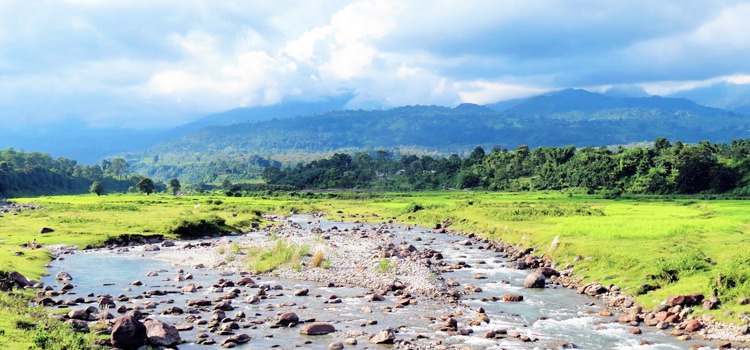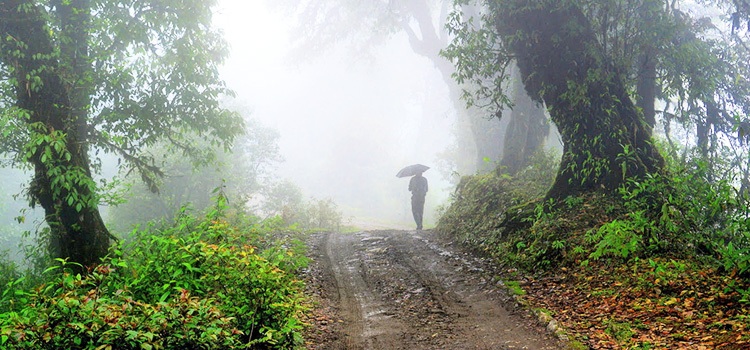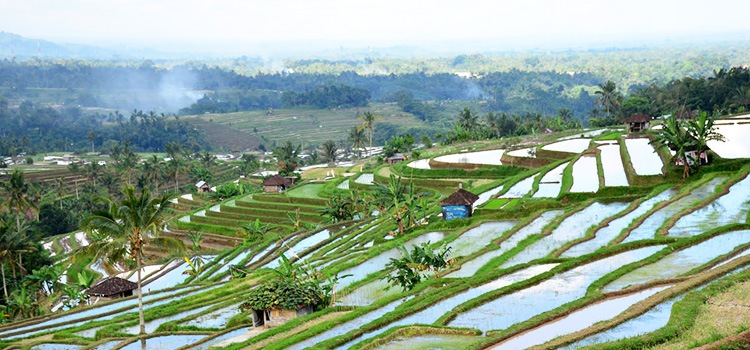Thematic Areas
Curriculum structure in SEES is closely tied with identified thematic areas. These include Hydrology, Human Ecology, Climate Change, Energy Studies, Food and Agriculture, and Marine Environments. A brief description of each thematic area follows.
Hydrology
Water makes life possible on planet Earth. While much of the planet’s surface is covered with water (and ice), only a tiny proportion of this water is directly used by human beings. Freshwater, produced by the hydrological cycle, is consumed by people to sustain human health and productive enterprises. Extraction, allocation, and use of freshwater resources are closely associated with climatic processes, ecosystem characteristics, and institutional systems. River basins, the natural hydrological units, are being rapidly altered through regulation, pollution, and climate change. In the Asian context, the situation is exacerbated by the very large quantities of sediments in river flows and the needs of a large, and rapidly urbanizing human population. Being cradles of many old civilizations, there are also deep cultural bonds between rivers and the people they sustain. Hydrological studies at the School of Ecology and Environment Studies, Nalanda University, therefore, adopts a comprehensive inter-disciplinary perspective encompassing natural sciences, social sciences, and humanities. The scientific dimensions of hydrology cover quantitative and qualitative aspects of surface and sub-surface waters. Various hydrological processes, the transport mechanism for solutes and particles and interactions with soil and vadose zone in different terrains help understand erosion, sedimentation, and shifts in land and water characteristics. These geological and geophysical dimensions lay down the basis for moisture regimes, nutrient availability, and habitat development. Hydroecology is an emerging discipline at the confluence of hydrology and ecology, providing frameworks to explore the role of water in nature and man. Water for human health, food production, and cultural values are derived from complex naturally and technologically influenced systems straddling traditional and modern institutions of governance. Students specializing in hydrology /hydrogeology/hydroecology at Nalanda University are typically solution-oriented, based on a wide disciplinary knowledge base and initiated into contemporary challenges in Asia. These include transboundary water use, river regulation, and inter-basin transfers, water-energy-food nexus, groundwater hydrological processes, and transport, drinking water and sanitation, multiple water use, urban water systems, etc.

Human Ecology
Human Ecology is a highly interdisciplinary field of engagement involving teaching, research and outreach programs that focus on holistic systems of interaction between people and their environment. Our activities are aimed toward deepening the state-of- art of our knowledge of human ecology with the ultimate goal of moving towards the sustainable use of natural resources in an equitable fashion. Our environment comprises of diverse social-ecological systems and our work ranges from studies of human health and behaviour, ecological and sociological processes mediated by the environment, to conservation practices at local, bio-regional and global scales.
We recognize that ecological and environmental problems have an undeniable social context and attempt to focus on solutions that take into account such complexity. Faculty from various disciplines use their knowledge and expertise in the natural and social sciences to study the effects of human activities on the environment and the effects of environmental change on human activities through education, outreach, and research programs that are integrative and ecologically focused towards both nature conservation and social equity.

Climate Change
Climate change and global warming are the recent major threats human society, it affects the basic elements of life support such as access to water, food, health and environment. These two effects are closely related to each other, global warming causes the climate change. Global warming is due to the excess use of greenhouse gases (GHGs); several scientific studies have pointed out that, if the world continue to consume fossil fuels and produce the GHGs at the rate it is consuming now will have a negative effect on the outer atmosphere, in result to this, the global temperatures will rise by several degrees.
The rising temperature has a direct impact on the climate, and due to climate change the world has already witnessed several extreme weather events such as severe floods in Asia and Europe, heavy rainfall and snow in the Northern Hemisphere, droughts in Southern Africa, heat waves in Indian subcontinent, USA and Europe, tornadoes in mid-west states of USA, unexpected tropical storms/hurricanes in Indian Subcontinent, USA and Caribbean Islands etc. These extreme events have become a major threat to weaker sections of world population, the climate change events are affecting poorest people disproportionately. India and other countries in the subcontinent are no exception. At Nalanda University, the students learn issues pertaining to climate change science and the economic aspects of climate change. The climate change thematic area discusses various national and international climate policies and explores the costs and benefits of adaptation and mitigation policies. The Climate Change research group at Nalanda University has been working on various policies to achieve climate resilience and development in the low and middle-income countries.

Energy Studies
Energy is very essential for our day to day needs, it provides services to various domestic and industrial activities such as lighting, cooking, heating, transportation etc. Energy is considered as an engine for the economic growth and social development. No economy can manage to grow without ensuring the minimum access to its population. So it is important to design, develop and deploy the sustainable energy systems that provides affordable energy for all the population of the country. In this regard, the Energy studies group at the Nalanda University examines various influential factors (scientific, political, environmental and socioeconomic factors) that influence the energy regulation and policies via active research as well as through curriculum. Therefore, students are exposed to various relevant topics such as sources of energy and understand the process of the energy generation, distribution and supply. The students also learn the economics behind the extraction cost, technology, demand side and supply side management issues and policies behind the development of the alternative energies.
Food and agriculture
Economically viable and environmentally sound agroecosystem management practices are crucial for sustaining agricultural productivity and thereby ensuring food and nutritional security to the growing millions. The ecological foundations vital for sustaining agricultural productivity, such as soil, water, biodiversity and forests are, however, under profound anthropogenic stresses. The agriculture sector also contributes about 17% of the total greenhouse gas (GHG) emissions in India. Agriculture and the forest sectors, however, have the potential to sequester substantial quantities of carbon which not only contributes to greenhouse gas mitigation but also contributes to agriculture production positively when stored in the soil. The school focusses on imparting knowledge on the principles and practices of sound and sustainable agroecosystem management and increasing the size of the terrestrial carbon sink through forests, agroforests, and various landscape-based strategies for mitigation of climate change. It also promotes research on agrarian changes taking place in India and other regions with a focus on sustainability challenges faced by agrarian systems and societies.

Marine and Coastal Environments
Asian countries, particularly those in the Indo-Pacific region, are deeply influenced by the various ecological, social, economic, and geopolitical processes in marine and coastal environments. While marine and coastal environments are frontiers for the access to new, and specific, resources that propel the global economy in the twenty-first century, there are genuine and pressing concerns about the sustainability of these development actions. Research and academic programs in this thematic area will support the quest for international partnerships in long-term ecosystem monitoring, expanding knowledge and understanding of marine resources (including the conservation of biodiversity), and building resilience to global climate change amongst vulnerable communities.
